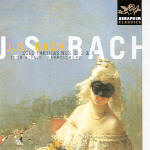Following its release of Bach’s Third, Fifth, and Sixth Keyboard Partitas, Seraphim brings out the remainder of Igor Kipnis’ superb cycle from the 1970s. As it happens, Partitas 1, 2, and 4 are my favorites of the six. Kipnis reveals their distinct structural and emotional profiles with interpretations that often take you by surprise, yet invariably prove convincing. Many keyboard practitioners play the introduction to the D major Partita’s overture with frills and freedom, and impart a steady drive to the main section. By contrast Kipnis imposes a dashingly strict tempo at the outset, yet brings lyrical flexibility to the main section. Similarly, the Gigues in Nos. 1 and 4 have more wiggle room than usual, and you can truly dance to these graceful minuets. In the B-flat Partita’s Sarabande, Kipnis at first outlines the melody and presents the fully ornamented version on the repeats. There’s plenty of variety in Kipnis’ registrations, from full-bodied, Landowska-like masses of sound, to delicate lute couplings. In short, I know few harpsichord versions of these works that fuse scholarship, imagination, and virtuosity to such compelling musical ends. What a wonderful disc!
































